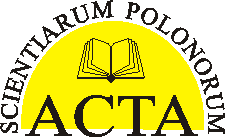Title
Changes in the concentrations of phenolic acids in carrot plants inoculated with Alternaria radicina Meier, Drechsler & Eddy
Autor
Bożena Cwalina-Ambroziak, Ryszard Amarowicz, Małgorzata Głosek, Michał Janiak
Keywords
Daucus carota L., plant health, pathogens, phenolic compounds
Abstract
Similary to other fungal species of the genus Alternaria, Alternaria radicina is a major pathogen that infects both the aboveground and underground parts of carrot plants. Changes in the concentrations of phenolic compounds are observed in infected carrot plants. Carrot seedlings were inoculated with the most pathogenic isolates of Alternaria radicina selected in a laboratory test. A phytopathological analysis was performed to determine the health status of carrot plants. The concentrations of phenolic acids in petioles were determined four weeks after inoculation with A. radicina and at harvest. The results of a greenhouse experiment revealed more severe disease symptoms on carrot plants cv. Koral inoculated with A. radicina isolates, compared with cv. Bolero. The content of the predominant phenolic acid (chlorogenic acid) was found to decrease in the leaf stalks of carrots cv. Koral inoculated with A. radicina. A statistically non-significant increase in chlorogenic acid levels was noted in the leaf stalks of carrots cv. Bolero in the experimental and control groups.
Pages
97-108
Cite
Cwalina-Ambroziak, B., Amarowicz, R., Głosek, M., Janiak, M. (2014). Changes in the concentrations of phenolic acids in carrot plants inoculated with Alternaria radicina Meier, Drechsler & Eddy. Acta Sci. Pol. Hortorum Cultus, 13(3), 97-108.
Full text


